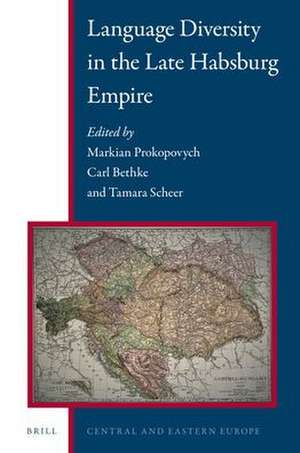Language Diversity in the Late Habsburg Empire: Central and Eastern Europe, cartea 9
Autor Markian Prokopovych, Carl Bethkeen Limba Engleză Hardback – 16 sep 2019
The Habsburg Empire often features in scholarship as a historical example of how language diversity and linguistic competence were essential to the functioning of the imperial state. Focusing critically on the urban-rural divide, on the importance of status for multilingual competence, on local governments, schools, the army and the urban public sphere, and on linguistic policies and practices in transition, this collective volume provides further evidence for both the merits of how language diversity was managed in Austria-Hungary and the problems and contradictions that surrounded those practices. The book includes contributions by Pieter M. Judson, Marta Verginella, Rok Stergar, Anamarija Lukić, Carl Bethke, Irina Marin, Ágoston Berecz, Csilla Fedinec, István Csernicskó, Matthäus Wehowski, Jan Fellerer, and Jeroen van Drunen.
Preț: 547.54 lei
Preț vechi: 667.74 lei
-18% Nou
104.79€ • 109.11$ • 88.56£
Carte indisponibilă temporar
Specificații
ISBN-10: 9004402101
Pagini: 274
Dimensiuni: 155 x 235 x 20 mm
Greutate: 0.54 kg
Editura: Brill
Colecția Brill
Seria Central and Eastern Europe
Cuprins
1 Language Diversity in the Late Habsburg Empire: Foreword from the Editors
Markian Prokopovych, Carl Bethke, and Tamara Scheer
2 Encounters with Language Diversity in Late Habsburg Austria
Pieter M. Judson
3 The Fight for the National Linguistic Primacy: Testimonies from the Austrian Littoral
Marta Verginella
4 The Evolution of Linguistic Policies and Practices of the Austro-Hungarian Armed Forces in the Era of Ethnic Nationalisms: the Case of Ljubljana-Laibach
Rok Stergar
5 Language Transition in the Town of Osijek at the End of Austro-Hungarian Rule (1902–1913)
Anamarija Lukić
6 The Bosnische Post: a Newspaper in Sarajevo, 1884–1903
Carl Bethke
7 K.u.K. Generals of Romanian Nationality and Their Views on the Language Question
Irina Marin
8 German and Romanian in Town Governments of Dualist Transylvania and the Banat
Ágoston Berecz
9 The People of the “Five Hundred Villages”: Hungarians, Rusyns, Jews, and Roma in the Transcarpathian Region in Austria–Hungary
Csilla Fedinec and István Csernicskó
10 Education in Habsburg Borderlands: the K.u.K. Staats-Oberrealschule in the Austrian Silesian Town of Teschen (1900–1921)
Matthäus Wehowski
11 Reconstructing Multilingualism in Everyday Life: the Case of Late Habsburg Lviv
Jan Fellerer
12 How Jesus Became a Woman, Climbed the Mountain, and Started to Roar: Habsburg Bukovina’s Celebrated Multilingualism at the Turn of the Twentieth Century
Jeroen van Drunen
Index





